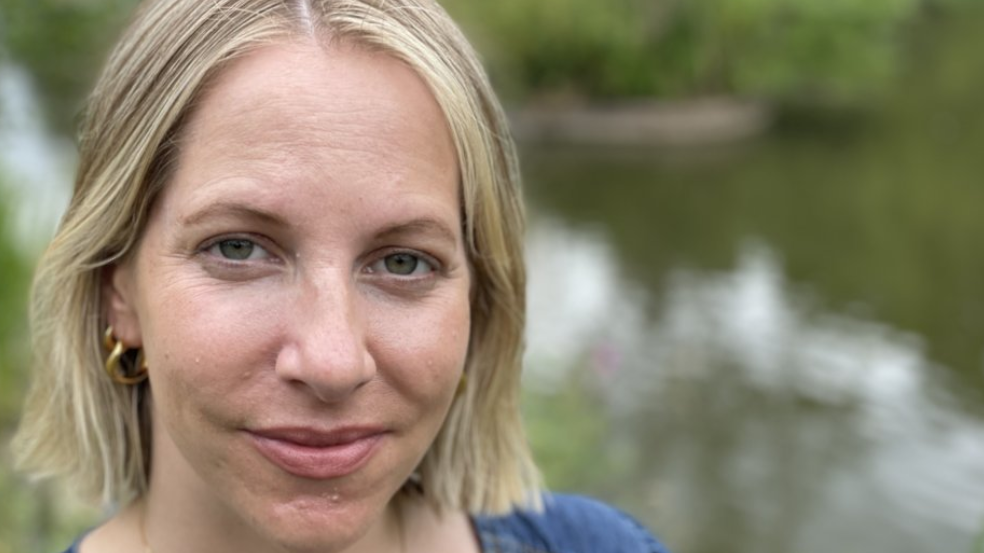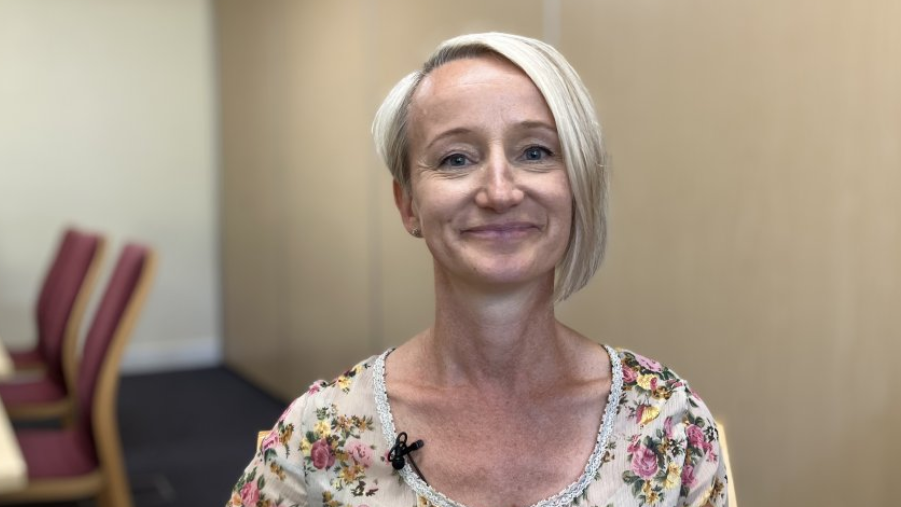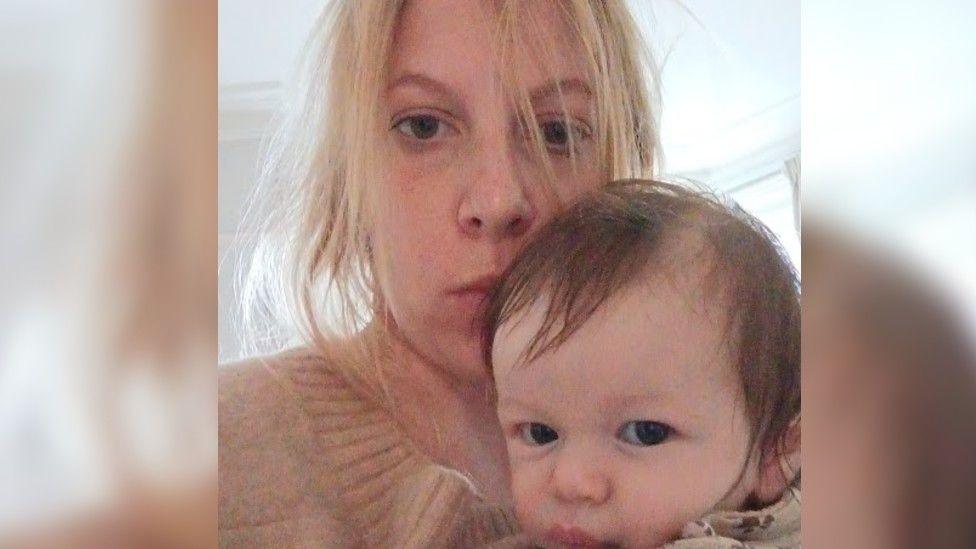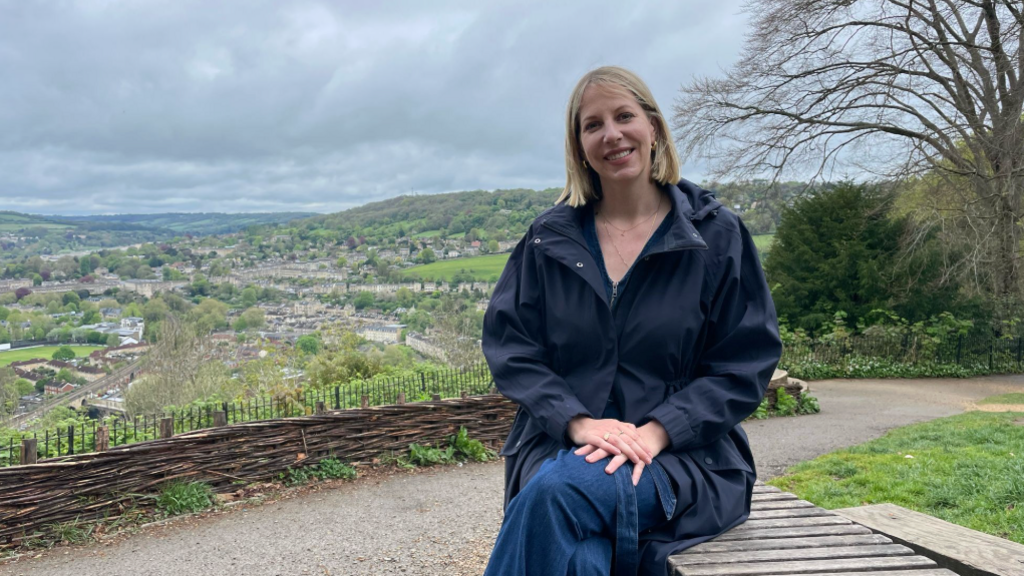'I had terrifying thoughts of hurting my newborn'

Becky, 36, was diagnosed with post-natal depression and anxiety
- Published
A mum who was plagued by thoughts of hurting herself and her newborn has spoken out amid a rise in new mums seeking help for their mental health.
A specialist service which provides perinatal mental health treatment in the west of England has seen an 80% rise in referrals in the past three years.
Becky, from Bath, said she had had "absolutely terrifying" thoughts of hurting her son and was at risk of taking her own life or abandoning her family before she asked her health visitor for help.
"Instead of judging me, they met me with so much empathy and understanding," the 36-year-old said. "I learned intrusive thoughts like the ones I was facing are actually really common, especially in new mums."
The two community perinatal mental health teams in the West, which operate in Bristol, Bath, North East Somerset, South Gloucestershire and Wiltshire, received 4,816 referrals in 2024-25 - up from 2,668 in 2022-23.
The service is run by Avon and Wiltshire Mental Health Partnership (AWP) and its clinical development lead Becky Eva said more awareness of its services and a better understanding of perinatal mental health had played a "significant role" in the rise.

Becky Eva is a specialist in perinatal mental health
Ms Eva explained maternal suicide was the leading cause of death for a woman in the first year of their child's life.
"The hope for the service is that we reach the women who need our service and we are able to give them access to psychological therapies and evidence-based treatment," she added.
Becky was supported by the service in 2023 after experiencing postnatal depression and severe anxiety.
While still in pain and recovering from giving birth, Becky said she had struggled to shower, eat and sleep while also trying to establish breastfeeding and care for her son.

Becky said she had "frightening" intrusive thoughts
"On top of that, I was getting these really frightening, intrusive thoughts about harming my son," she added.
"These thoughts, they absolutely terrified me."
After experiencing symptoms for about six months, Becky said she had ended up "fleeing" her home in her dressing gown one evening after her husband had arrived home.
She said: "I walked to the nearest park in the dark and I walked around thinking 'I can't look after my son'.
"Everyone was telling me that I should enjoy this time, that this time goes so fast, and aren't I lucky? And I'm really struggling."
'Repulsed'
Becky said she had had "just enough grip on reality" that she returned home and asked for help from her health visitor.
She was sent for a rapid assessment and received support at home from the mental health team until her son was one year old.
She said she had been "repulsed" by the intrusive thoughts and "desperately" did not want to act on them, meaning she was not considered a threat to herself or her baby and was treated at home rather than in a mother and baby unit.

Becky, 36, was supported by mental health professionals until her son was one year old
Becky told the BBC she felt it was "no surprise" an increasing number of women were using the service.
"I think a lot of it comes down to a lack of support we have within our community," she said.
"We're increasingly segregated and expected to raise our children on our own, whereas previous generations raised them within the family, within the community."
She added: "Without the support from peers and the mental health team, I think I was at serious risk of taking my life or potentially abandoning my family."
The National Institute for Health and Care Excellence has said mental health problems frequently go unrecognised and untreated, with some women not seeking help due to the fear of stigma or of intervention by social service.
It adds perinatal mental health problems can have significant and long-lasting effects on a woman and her family, as well as on children's emotional, social and cognitive development.
Ms Eva said AWP had provided training to help clinicians and people supporting new mothers recognise the signs of mental ill health.
"Mental health can deteriorate for a number of reasons, with additional stresses around finances and interpersonal relationships," she said.
"Our maternity and health visiting colleagues do those routine checks. We have done a lot of work to create a single point of access, which means all referrals come through to the specialist team.
"By having this single point of access, it creates a much better safety net."
If you have been affected by any of the issues in this story, information and support is available at BBC Action Line.
Get in touch
Tell us which stories we should cover in Bristol
Follow BBC Bristol on Facebook, external, X, external and Instagram, external. Send your story ideas to us on email or via WhatsApp on 0800 313 4630.